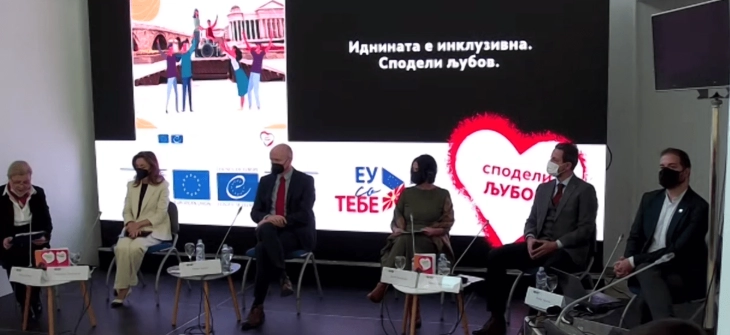No Hate Speech campaign: Block the Hatred, Share the Love

Skopje, 20 December 2021 (MIA) – Legislative changes are required in the fight against hate speech, but the most important aspect is the collective response of the entire society in saying ‘no’ to stigma and ‘no’ to prejudice. The right of one person is the right for others, so let’s block hatred together, share the love and build a just society free of prejudice, heard Monday the launch of a joint European Union and Council of Europe campaign “Block the Hatred, Share the Love” that focuses on the fight against hate speech.
Katalin Tamus of the Council of Europe Programme Office in Skopje said the CoE is on the frontlines in the fight against hate speech across the continent.
“This campaign aims to highlight the Council of Europe standards and monitor hate speech in people’s daily lives. All these activities have the objective of raising the awareness on the damaging effects on those who are target of hate speech leading to their elimination,” said Tamus.
First Lady Elizabeta Gjorgievska said the campaign is launched on International Human Solidarity Day-December 20, since solidarity is preparedness to help the vulnerable and underprivileged, including victims of hate.
“We need solidarity especially now, when hatred spreads swiftly and easily at social networks, media and in the virtual world, overflowing into the real world and relations among people. When faced with hate, we can respond in three ways: the first is to respond with hate towards the one who hates us, the second is to be indifferent observers and thus become passive accomplices to hate. The only adequate response, according to me, is to respect the dignity of those who are different. In this way, we block hatred in action and share the love that is understood as care for the innate dignity of the vulnerable. All free democracies are faced with the challenge of coping with hate speech but without restricting the fundamental freedom of speech,” said Gjorgievska.
Freek Janmaat of the EU Delegation to Skopje said about 52 percent of girls and women have experienced online violence, including sexual violence threats, while persons with disabilities are exposed to increasing risk of violent behavior and bullying.
“These trends are on the rise because of economic, social and environmental changes. The COVID-19 pandemic is one of the factors that contribute to this rise. The European Commission believes there is no alternative to enlarging hate crimes and this is the only way to have an effective approach by criminal law in ensuring protection of victims,” added Janmaat.
Vesna Bendevska, Chair of the Commission for Prevention and Protection from Discrimination, said hate speech is the real threat to the enjoyment of human rights guaranteed by the Constitution and the international human rights’ conventions that the country has ratified.
“Hate speech is much more than words. They say the language has no bones but breaks bones. Such speech intends to hurt, offend, destroy someone’s dignity and integrity, belittle and humiliate. Hate speech has nothing in common with freedom of speech and is fed by prejudice, stereotypes and lack of information. While freedom of speech stimulates healthy debate, hate speech incites violence. Hate speech cannot be treated in the same way as hate, the only cure is love. This is a common battle and depends on all of us,” noted Bendevska.
The online campaign will be carried out at various web channels and social media but also at traditional media and through public events. It involves famous personalities, institutions and human rights’ activists who will promote diversity and equality in local communities across the region through personal testimonies and exchange of good practices.







